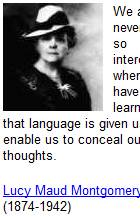The depths of science fiction
Gone are the days when admitting you read fantasy meant to most people that you were keen on soft porn. At least I think they’re gone. But still you come across the view that science fiction and fantasy are lightweight, superficial genres, the latter for girly girls who buy those books called things like Make Your Own Love Potions and the former for spotty, sciency, adolescent males. NOT TRUE! Setting a story in the future or the mythical past, an alternative present or an imaginary Middle Ages, on another planet or Atlantis… need no make it any less three-dimensional and rich – and believable – than literary realism. The scope for psychological, ethical and even theological questions is far wider (and deeper) in sf/f than anywhere else.
I keep wanting to say this, but you know when someone says exactly what you mean, only better? Here’s Jo Walton* (in her blog at Tor):
‘In science fiction you can have any kind of story—a romance or a mystery or a reflection of human nature, or anything at all. But as well as that, you have infinite possibility. You can tell different stories about human nature when you can compare it to android nature, or alien nature. You can examine it in different ways when you can write about people living for two hundred years, or being relativistically separated, or under a curse. You have more colours for your palette, more lights to illuminate your scene.’
And, for me, that’s the whole point of reading sf/f. (After ‘science fiction’ I would add ‘and fantasy’.)
Trouble is, all things perceived as ‘alternative’ (faiths, traditional healing, classical music…) suffer from the visibility of its cheap-n-popular versions. The unthinking will stick with Holst’s Planets or those hero-n-dragon trashy ‘novel’ series that seem to be written by machine. Since the unthinking are in the majority, of course these things are more evident in daily life than the real McCoy.
So even those who think may dismiss the genre according to their opinion on that thin gnomon**. But if they’re lucky the thinking will get past the image problem the genre has among the unadventurous, and happen upon the stronger stuff
Again, Ms Walton puts it better. She goes on to say:
‘Now the problem with genre fiction is often that writers take those extra lights and colours and splash them around as if the fact that the result is shiny is sufficient, which it unfortunately isn’t. So the most common failing of genre fiction is that you get shallow stories with feeble characters redeemed only by the machinations of evil wizards or the fascinating spaceship economy or whatever. What I want is stories as well written and characterised as Middlemarch, but with more options for what can happen. That’s what I always hope for, and that’s what I get from the best of SF.’
Well, I feel better for getting that off my chest.
* Jo Walton is the author of seven novels, including the World Fantasy Award-winning Tooth and Claw (and another out next spring), and of an always interesting and intelligent blog on Tor.com. Her LiveJournal link works but, as I write, her website seems to be dead.
** Gnomon. A word I never thought I’d use in an essay.




Excellent article. I thoroughly and whole-heartedly agree with your comments.
What about magical realism? That’s a genre the literary establishment seem keen on – but isn’t it just another word for ‘fantasy’?!
Not sure if it is… someone did a great post on the Tor.com blog about that very question, before Christmas i think, and i can’t find it again. Something about
I do remember a point being made that genres – a term used by critics – are toolboxes, and for the writer it’s ok to take tools from any of the boxes to get devices that work together. The poor critics then do their heads in working out which genre a piece of fiction ‘fits into’.
Nice to feel that powerful, as a writer.
Heck, i haven’t been a writer here for ages; haven’t posted anything of my own writing (i don’t count blogposts as ‘my writing’) this year. Eek.
She’s got a point, this Ms. Walton.
The thing is, the best writers are novelists no matter what the set dressing is like and I could, with very little provocation, rattle off dozens of names who deserve to be read by everyone.
Maybe on my own blog.
The best novelists have a commonality: they write a damn good story and they keep you entertained all the way through the process. My own taste in writers is a bit eclectic, but I think the likes of China Mieville and Jon-Courtney Grimwood are up there with the likes of Dickens and his ilk, and I read anything that happens across my path genre or not.
That will make a good post, Dave.
‘Read anything that happens across my path’ – me too, but so many people do dismiss things based on what they think they pre-know.